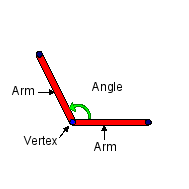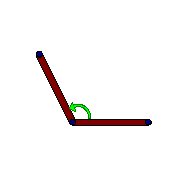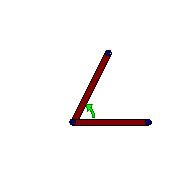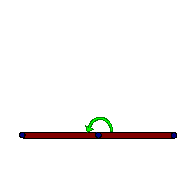Rectilinear angle (geometry): Difference between revisions
Jump to navigation
Jump to search

imported>Miguel Adérito Trigueira (add {{subpages}}) |
imported>Miguel Adérito Trigueira m (→Straight angle: typo) |
||
| Line 35: | Line 35: | ||
| | | | ||
==Straight angle== | ==Straight angle== | ||
[[Image:Straight angle (geometry).png|frame|left|Diagram showing | [[Image:Straight angle (geometry).png|frame|left|Diagram showing a straight angle (in green)]] | ||
A '''straight angle''' is the angle formed on a straight line. It is equal on both sides of the line. It is equal to the sum of two right angles. | A '''straight angle''' is the angle formed on a straight line. It is equal on both sides of the line. It is equal to the sum of two right angles. | ||
|} | |} | ||
Revision as of 05:20, 22 October 2008
|
A rectilinear angle or angle is the "steepness" between two straight lines. The point at which the lines intersect is called the vertex. The parts of the line that extend from the vertex and surround the "steepness" are called the arms. This angle is measured in degrees (parts of 360). This angle can also be measured in radians. There are various special types of angles:
|
Obtuse angleAn obtuse angle is one where the magnitude of the angle is greater than a right angle, but less than a straight angle. |
Acute angleAn acute angle is one where the magnitude of the angle is less than a right angle. |
Straight angleA straight angle is the angle formed on a straight line. It is equal on both sides of the line. It is equal to the sum of two right angles. |



